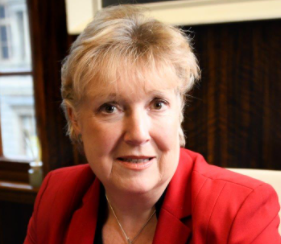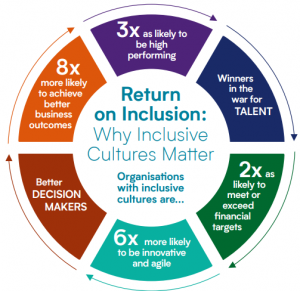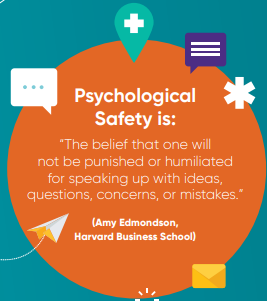Evolving Leadership: Dr Orlaigh Quinn (DETE)
By David Larkin | 13th April 2022
IMI Board member Dr Orlaigh Quinn, the Secretary General at the Department of Enterprise, Trade and Employment (DETE), shares insights on how the leadership cohort evolved in the Department through an ambitious people-focused project.
In October 2020, the Department of Enterprise, Trade and Employment (DETE) management team approved the launch of the Connected Teams project, an initiative to identify and promote behaviours that supported effective remote and blended working.
As a radical overhaul of the ways of working within the Department was carried out, leaders were asked to step up. A set of best practices did not yet exist; the project aimed to shape the new reality through a concentrated focus on people under five key headings:
- Connectedness
- On-the-job training and coaching
- Flow of information
- Collaboration and innovation
- Wellbeing
 IMI Board member Dr Orlaigh Quinn, the Secretary General at the DETE, spoke to us about the actions the Department took to execute the project, how the leadership cohort strongly came to the fore throughout, and how the overall leadership evolved in the organisation as a result.
IMI Board member Dr Orlaigh Quinn, the Secretary General at the DETE, spoke to us about the actions the Department took to execute the project, how the leadership cohort strongly came to the fore throughout, and how the overall leadership evolved in the organisation as a result.
This piece is part of our thought leadership collection on Evolving Leadership.
Taking the initiative amid uncertainty
The first step the Department took was to acknowledge the clear challenge that the changing circumstances presented and act quickly to limit their impact. Not only did the Department have to run their own organisation, but they were also focused on supporting the thousands of companies across Ireland impacted by the Covid-19 pandemic.
“When companies and organisations were forced to work from home overnight, we all faced the same challenge: how did we continue to meet our business needs and keep our staff connected,” said Dr Orlaigh Quinn.
“Thanks to our staff, we continued to meet our business needs in very difficult circumstances. However, it quickly became apparent that many staff were finding remote working difficult. We knew we had to find new ways to communicate while keeping our staff connected, particularly our new staff.”
Through a series of facilitated workshops, each team within the Department assessed their remote working performance, developed a shared vision of future performance and agreed to a set of actions needed to achieve that vision.
This iterative process led to further reflections on progress made and what steps were needed to address the remaining challenges and opportunities for achieving the desired change.
The ‘first-mover’ approach taken by the Department allowed it to adapt in an agile way, smoothing the transition to a blended and remote model of working in the face of ongoing uncertainty. The new paradigm within the Department triggered a change in leadership mindset and actions, which became more and more apparent over time.

IMI Insight – IMI Associate Carol Mannion:
“Strong systems leaders view the organisation as a complex but adaptive system, where all elements are interconnected. They take into account the ripple effect of any change or decision. Organisations are human systems that adapt organically as well as mechanistically to change.” Read more of Carol’s insights here
Focusing on people from the outset
“Our Connected Teams project set out to harness the innovation of our workforce, seeking their views and ideas with the aim of identifying and promoting behaviours that supported effective remote and blended working,” said Orlaigh Quinn.
A major vehicle for achieving the connectedness that the Department aimed for was the Peer2Peer Network, an initiative that paired new starters with more experienced staff to build networks and help these new joiners to expand their knowledge of the Department’s work. With over 220 new recruits joining over the past two years, the initiative was about ‘reigniting those valuable connections that tend to happen five minutes before and five minutes after meetings’, as Orlaigh described it.
With between 70 and 90 percent of learning in the workplace occurring through what people experience on the job and informally, the Peer2Peer Network enabled that knowledge to be passed along. This so-called tacit knowledge is the basis for 90 percent of the knowledge on which performance in real-world settings is based (1). In other words, it is the sharing of critical knowledge that is not on paper or formalised in documents, but rather embedded in people’s heads.
With the project focusing strongly on empowering people, both among the new additions and those already within the Department, the evolution and the response from leaders was immediate.
“Existing staff have absolutely stepped up to meet this ask with more than 100 people now involved in the network,” said Orlaigh. “It’s shown us how our managers have huge corporate knowledge in different areas across the Department.”
IMI Insight: Tacit knowledge is an essential element in organisational competitiveness, as it sparks innovation through strong social connections, knowledge sharing and new learning.
 From our Infographic – Creating a Culture of Inclusion in the Hybrid Workplace:
From our Infographic – Creating a Culture of Inclusion in the Hybrid Workplace:
“Set aside time in the schedule for structured remote team-building exercises, creating a network effect within the team to make up for lost face time in the office. The inclusive leader will be able to comfortably facilitate connections to ensure that team members who would not typically have the chance to interact and collaborate can do just that. If done correctly, virtual meetings can become more inclusive, with meeting attendees energised, engaged and less likely to go into ‘observer mode’.”
We now see that a new style of leadership is evolving. Leaders are investing time in team building and organisational culture, but there is also a flattening of the hierarchy. – Dr Orlaigh Quinn
Fostering an expectation to lead by example
When ‘business as usual’ is interrupted by internal or external factors, leadership cohorts are expected to act decisively. What Orlaigh Quinn and the Department noticed was a change in not only the organisational structure, but also in how new leaders emerged in a time of rapid transition.
“We now see that a new style of leadership is evolving,” said Orlaigh Quinn. “Innovation and openness to new ideas is already part of the Department’s culture, but the Connected Teams plan and the remote working experience has pushed this even further.
“Leaders are investing time in team building and in promoting the organisation culture, but there is also a flattening of the hierarchy. Regardless of position in the organisation, there is now an expectation that everyone has a part to play, and this is being reflected in all performance management conversations and business planning discussions.”
 IMI Insight – IMI Associate Paidi O’Reilly:
IMI Insight – IMI Associate Paidi O’Reilly:
“When leaders acknowledge the uncertainty of disruption, their thinking changes and they start a journey towards a higher order of transformative thinking and innovation. Having the bravery and audacity to ask “What might be next” is critical to firing the collective imagination of the organisation. In fast-moving and complex environments, organisations need to seek answers from those at the edges of business that are often more attuned to the waves of change and are less invested in the status quo.” Read more of Paidi’s insights here
Harnessing the value of an external perspective
The Department prioritised a collaborative and consultative approach throughout the project, drawing on external experience which enabled it to be streamlined. Building on this, a series of collaborative learning sessions were carried out to support and sustain remote engagement.
“We recognise the value of an external perspective, as we routinely engage with stakeholders drawn from a range of sectors in the development of our policy work,” said Orlaigh. “Our external project partners in this instance were Grant Thornton and they brought their experience of working with global organisations which have moved from physical to remote or dispersed working environments.
“Their involvement was hugely beneficial as they asked questions of us during the process, based on their prior experience, that we may not have thought of immediately. It also changed the dynamic of the process, and our participants freely shared their thoughts with the consultants in a way that they may not have done with a colleague.”
In special meetings with the senior leadership team, staff participants highlighted the need to strengthen skills and capabilities for collaborative problem-solving in remote and blended environments.
The external consultation provided a valuable forum for staff to ‘freely share their thoughts’ in a psychologically safe way, injecting the project with the momentum it needed and playing a vital part in the Department’s execution of the strategy overall.
 IMI Insight: Psychological safety has been called the ‘precursor to adaptive, innovative performance – at the individual, team and organisation level’. With team members working remotely, however, the lack of opportunities to interact and decreased visibility have led to some employees feeling isolated and stressed.
IMI Insight: Psychological safety has been called the ‘precursor to adaptive, innovative performance – at the individual, team and organisation level’. With team members working remotely, however, the lack of opportunities to interact and decreased visibility have led to some employees feeling isolated and stressed.
These emotions are tied to reduced performance and, crucially, negatively impact psychological safety. Given that high-performing teams and psychological safety go hand in hand, and the recognition that an absence of psychological safety in workplaces can have major repercussions across the business, leadership within organisations must create the conditions to combat the challenge. Read more in our infographic
‘We had to get it right for our own people’
With existing leaders stepping up and new leaders emerging, the Department was able to pivot to a new direction and drive an evolved leadership culture through the project.
“This approach has paid wider dividends for the organisation and positioned us as an employer of choice,” said Orlaigh.
“We have a big leadership role in this area given that our Department produced the National Remote Working Strategy, ‘Making Remote Work’.
“So, we knew we had to get it right for our own people. Doing so involved everybody across the organisation taking leadership positions to prioritise connectivity.”
—
Dr Orlaigh Quinn is an IMI Board member and the Secretary General of the Department of Enterprise, Trade and Employment. She is a senior professional leader in the public sector operating at management board and international level and has significant experience advising on policy, strategy evaluation and legislation.
For more IMI Insights, go here.
For more on the DETE project, click here.






